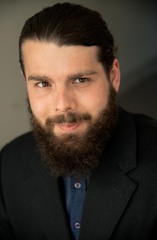Kontakt
80799 München
E-Mail:
S.Haffner@lmu.de
Website:
IDK-Profile
Arbeitsgruppe
Internationales Doktorandenkolleg (IDK) Philologie:
Praktiken vormoderner Kulturen, globale Perspektiven und Zukunftskonzepte im Elitenetzwerk Bayern
Karaites were a Jewish, Middle Eastern law school in the Middle Ages: Contrary to the Rabbanites, they were not accepting the corpus of Rabbinic literature (Mishna, Talmud, etc.) as a legitimate basis for discussing legal matters. Instead, they were relying exclusively on the text of the Hebrew Bible, and it is from their careful reading that they derived their designation: The Hebrew word qārā (קרא) means ‘reading’. During this, under the influence of the work of the Masoretes (the māsorā [מסורה] is the pronunciation tradition of the biblical text) and the parallel emergence of Arabic grammar, a separate grammatical tradition between hermeneutics on the one hand and linguistics on the other developed:
The study of grammar aims at a better understanding of the Biblical text, the Divine Law, and the improvement of the readers’ skill to distinguish among various interpretations the correct ones from those which are not. ʾAbū Yaʿqūb Yūsuf ibn Nūḥ who represents the early Karaite tradition limits himself in his Diqduq, a verse-by-verse commentary of the Hebrew Bible, to single words that he regards in need of elucidation which he often explains through morphological patterns. His pupil and successor as the leader of the Karaite academy in Jerusalem, ʾAbū al-Faraj Hārūn, in turn, wrote a ‘Comprehensive Book’ on the Hebrew language (כתאב אלמשתמל) of which he later created a shortened version, the ‘Sufficient Book’ (אלכתאב אלכאפי). In contrast to ibn Nūḥ, ʾAbū al-Faraj attempts a systematic description of not only the Hebrew language but also of language in general. However, his engagement also relies on the awareness of linguistic – quite in the modern sense – structures.
In my project, I will shed more light on this tension by tracing the basic features of early medieval Karaite language thought, elaborating its conception of language, its analytical elements, and its relationship to contemporary Arabic and Jewish non-Karaite engagement with language. My interest lies particularly in the questions of origin and status of language, the elements and technical terms of its analysis, aspects of orality and scribality, and figurative/non-literal language use.
Finally, I want to understand these works of grammar under consideration as philological in the double sense of logos: On the one side, we can observe an extensive study of single words as linguistic structures, on the other, the entire engagement finally serves as an important instrument of understanding the Divine Law correctly.
Simon Haffner is member of the Munich Research Center for Jewish-Arabic Cultures. For further information consult the profile on the website.
Weitere Informationen


